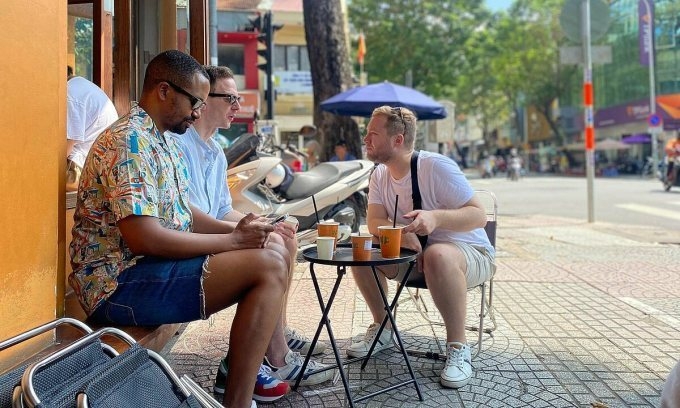Why Vietnam has emerged as popular destination for digital nomads
4 min read
Mike, a 26-year-old Russian tourist who has been working remotely for nearly a month in Ho Chi Minh City, said the friendly visa policy is the most important factor for digital nomads like him.
“Vietnam is really a popular choice for digital nomads like me thanks to the 90-day tourist visa,” Mike said.
“I think if I went to Thailand, I could probably stay there for about 45 days, which isn’t much. So, every 45 days, I must do some visa procedures and it’s very complicated.”
Mike said Malaysia seems to be less safe while Indonesia has strict visa conditions for remote workers.
“In Vietnam, I can stay here for three months and have more flexible time to work and travel without having to worry that I can’t balance my time. Vietnam has many interesting things for digital nomads like us to visit and explore and everyone there speaks good English, especially in Saigon.”
Renting an apartment in District 7, home to the largest expat hub, and sitting at a cafe to work every day, the Russian spends 20 hours a week doing web programming.
For the rest of time, he explores cuisine and culture in HCMC.
Vietnam started granting 90-day tourist visas for citizens of all countries and territories starting from Aug. 15 this year.
Indonesia, Thailand and Malaysia are the only three countries in Southeast Asia now offering visas specifically for digital nomads but with strict requirements.
Indonesia requires visa applicants to have proof of funds of at least 2 billion Indonesia rupiahs, or $130,000, in their bank account while Malaysia wants remote workers to have an annual income of at least $24,000.
Those wanting to apply for the digital nomad visa category must earn at least $80,000 annually and hold a master’s degree and they must also be employed by a company that’s publicly listed on a stock exchange, or has a combined revenue of at least $150 million in the three years prior to the visa application.
In addition to convenient visa policy, the cheap cost of living in Vietnam’s tourist cities is also a plus for digital nomads, those coming from Europe with higher expenses.
Andrey, a Serbian citizen, said he had traveled to and worked in more than 10 countries, and Vietnam was an ideal destination due to low living costs.
“I stayed in Phu Quoc for eight months, but because it was so beautiful, I spent most of my time traveling and not working. So, I then moved to Da Nang so I could meet more digital nomad communities,” he said.
“In Da Nang, I work seven hours a day, and spend the rest of the time traveling and exploring everywhere.”
In Phu Quoc or Da Nang, he rented an apartment with a separate bedroom and kitchen and a swimming pool on balcony at VND6 million (US$245) a month and spent around VND5 million ($204) on food.
“On avaerge, I spent around US$700 a month, much cheaper than the living costs in Malaysia or Thailand,” he said.
Da Nang, Hanoi and Ho Chi Minh City recently joined a list of the 10 fastest-growing remote work hubs for digital nomads, according to Nomad List, the biggest crowd-sourced database of remote workers around the world.
The report showed the monthly cost of living for a nomad in Da Nang was $942.
Beautiful landscapes and low crime rates were also an important factor that pushed Vietnam’s rising profile in the digital nomad community.
Tim, a 40-year-old American who has been traveling and working in Da Nang for more than a year now as a graphic designer, said he used to be banned by his mother from traveling to Vietnam.
His mother warned that he could be killed on roads if he went to Vietnam to work remotely and he feared for a long time, thinking that Vietnam was dangerous.
After arriving in Vietnam, he was impressed by beautiful the landscapes and friendliness of the locals.
He said he spends five to six hours working online every day, and the rest of his time he explores natural landscapes or participates in volunteer activities with local people.
“Vietnam is a modern and developing country. The technology sector is developing very quickly, especially in central Vietnam. I really fell in love with Vietnam from the first day I came there, the people, landscape, life and everything,” he said.
Nguyen Tran Hoang Phuong, director of the Institute of Social Tourism Research, proposed that Vietnam needs to make statistics on the number of digital nomads to offer appropriate policies in the future and avoid people causing social disorder.
Phuong said the population of digital nomads will grow quickly in the coming time thanks to longer visas and Vietnam could learn from Thailand to boost revenues from the group.
For example, travel agencies in Thailand currently offer half-day or one-day tours for digital nomads to explore landscapes and culture in their country and Thais also offer services specifically for digital nomads to increase revenues from the group.



